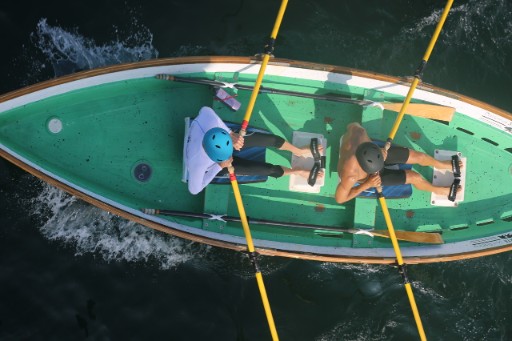48th Anniversary Story Contest – Honorable Mention, 1964-1975 Uncle Sam Wants you

Honorable Mention, “Lifeguard Dorymen” by Joel Gitelson. Hermosa Beach, August 2017. Canon 5D Mark IV. 38 Magnus.
“1964-1975—Uncle Sam Wants you”
by Pete Whalon
Allow me to transport you back in time to a chaotic period in our nation’s history. It was an era when turning 18 years old proved a day of foreboding and dread for most young males living in the South Bay. The stone-cold reality — all young men were required to register for the military draft. With the war in Southeast Asia escalating, these teenagers might now be sent to Vietnam, where being wounded or killed in the confusing, unpopular war a disturbing possibility.
For my final three years at Redondo High, the dark, looming cloud of the draft hung over the heads of my friends and me. When a fellow student turned 18 (usually in their senior year) the fateful news swept through the school like a wildfire. As the birthday boy strolled the campus of Redondo High, other students would salute and sarcastically mock him with taunts of, “Happy Birthday Private Whalon,” or “Keep your head down Sergeant Whalon.” My personal favorite was someone singing an off-key rendition of “Soldier Boy” as we walked through the hallowed halls of Redondo High School. “Soldier Boy” was a popular song, released by The Shirelles in 1962.
As March 6, 1967 (my 18th birthday) loomed, the psychological and internal effects were palpable. I attempted to mask my feelings of doom. I smiled and joked when the harsh taunts from my peers began. The most common barbs included, dying in the insect-infested jungles of Nam or returning home with no legs or your balls blown off.
One of the most stressful events of each day became the afternoon mail delivery. When I would hear that small, metal door slam shut by the mailman in our front yard, my mouth went dry, my heart doubled its beats and my legs slightly buckled. If my mom had not already retrieved our mail, I wanted to be the one to make the torturous, 20-foot journey to the container that just might hold my death warrant.
Occasionally, I would sit on our brick wall, a few feet from the “metallic beast,” for 10 minutes or more. Eventually, I mustered the courage to whip open the hatch and grab the contents. My symptoms would instantly vanish as I realized there was no letter with a picture of Uncle Sam pointing at me or a return address with a government sticker on it. Safe for another 24 hours. Years later, not long before her death, my mom confided in me that sometimes she would shed a tear watching me sitting on the wall, gazing at that evil box.
I happened to be one of those young men (we really were not yet “men”) who received a draft notice and ended up in Vietnam. Luckily, I was one of the fortunate soldiers who avoided combat.
Many teens had passionately patriotic, World War II veterans as their fathers, including me. Avoiding the draft, especially skulking off to Canada, was not an option. My father did fear for my safety. However, he seemed genuinely proud of me, and would brag about my tour in Nam to his friends when I returned in 1971.
Most of my high school buddie’s and casual friends wanted no part of an all expenses paid trip to the tropical jungles of Southeast Asia. But there were a small number of gung ho guys who had watched too many John Wayne, World War II movies and actually wanted to join the military, go to Vietnam and “blow away” some Viet Cong soldiers. One of those young, gung ho guys was a good friend of mine. Robert Nardelli, born March 8, 1949, (two days after my birth). He dropped out of Redondo High in 1967 to join the Army. He was soon sent to Vietnam and was sadly killed by “friendly fire,” which the military now refers to as “accidental homicide.” He died on February 9, 1968, in Kien Hoe, South Vietnam. You can find his name on the Vietnam Veterans Memorial Wall — Panel 38 E — Line 57. He was the first of Redondo High students killed in Nam.
There were ways of avoiding the draft. The most drastic of those choices meant packing your bags and fleeing to Canada. Canada would not extradite anyone who crossed their southern border to avoid the draft. Of course, if you returned to the United States you would be prosecuted. The U.S. continued to prosecute draft dodgers until 1977 (two years after the official end to the Vietnam War). Then, one day after his inauguration, President Jimmy Carter fulfilled a campaign promise by offering pardons to anyone who had evaded the draft and requested one. It was not a popular decision among those who served in Vietnam or the relatives of those who lost their lives there.
Less drastic, ways to avoid the draft included attending college or faking an injury or medical condition and getting a doctor to sign off on it. Other opportunities included, joining the Coast Guard or Army Reserves (by 1967, the waiting list was five years) or getting married and having children. Unfortunately, none of these options were fool-proof. If Sam called, you went.
Ask any male today, ages of 65 to 75. They will be able to explain exactly how they ended up in the military or how they avoided military service. Of the 2.7 million Americans who served in Vietnam, 304,000 were wounded and 58,220 died.

